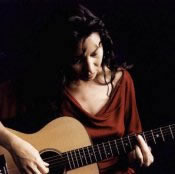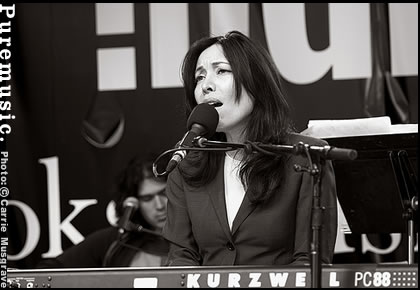A Conversation with
Anjani
(continued)
PM: I thought Greg Leisz added some beautiful music on "Never Got To Love You."
ANJANI: Uh-huh.
PM: I mean, he's just that way. Who brought him in? Is he a buddy?
ANJANI: He was not a buddy, but let me try to think of who recommended him.
PM: Ed bring him?
ANJANI: No, Ed did not. I knew that he'd played some with Joni.
PM: He's so amazing.
ANJANI: I do remember. But there aren't a lot of great steel players in L.A.
PM: Yeah, more of them here.
ANJANI: Yeah.
PM: But even here people say Greg Leisz' name with hushed tones.
ANJANI: Mmm.
PM: Yeah, he's very highly thought of, even here, in a town where steel players are not as hard to find.
ANJANI: No. And he's a swell guy. He's just so fine, and just a real sweetheart.
PM: Well, maybe you'd tell us a little about Ed Sanders, who figures in not only as studio/engineer/mixer, but as a co-producer, ultimately.
ANJANI: Yes. I found Ed when I was in the process of making my first record. He's got a lovely modest studio down there in downtown L.A. It's an analog studio.
PM: It's getting hard to find them anymore.
ANJANI: Heck to find. I think the only reason why he has one is that he has a double degree in audio and electrical engineering, and he maintains the place himself, so he's a kind of one-man operation, and fixes the board if it needs to be tended to. So he's got that, and he also had Protools, so he's kind of the best of both worlds.
PM: Oh, he swings both ways.
ANJANI: Yeah. So we just have a real nice setup there. He's just there. He's kind of our third part of the triangle there. He doesn't really have much producing say, but he's there, and if we say, "Do you like that or not?" he gives a yes or no. That's worth a lot to us because you can be the deal breaker when you're the third person.
[laughter]
PM: Oh, absolutely. It's the third person that causes the problem.
ANJANI: Right. And he happens to be one of the most diplomatic gentlemen that I know, I mean, very--again, kind of like Greg in that manner, very soft-spoken and kind-hearted and sensible and very even-keeled.

PM: You seem to have both a folk and a jazz sensibility. Is folk, like jazz, some part of your background?
ANJANI: Oh, folk, definitely. Yeah, growing up, my first instrument was guitar. And I learned to play off PBS television.
PM: Wow! Of all the interviews I've done, I've never heard somebody say that! That's fantastic!
[laughter]
ANJANI: Yeah. There was some woman who had a learn-to-play-guitar show on PBS. And this is back in Hawaii. And I would be playing like "Go Tell Aunt Rhody."
[laughter]
PM: That's fantastic! "I learned to play from TV."
ANJANI: "Greensleeves," and "Go Tell it on the Mountain," "Michael Row the Boat Ashore." I mean, it wasn't tough stuff, but I just got some basic chords down. And then I got into--loved James Taylor and--
PM: The whole '70s songwriter thing, right.
ANJANI: Yeah, yeah! All the brilliant writers, oh, my God. Terrific.
PM: What do you find yourself listening to now? Do you find time, make time, to listen to records? Is that part of your deal?
ANJANI: Boy, someone asked me that the other day, and I was almost embarrassed to say that no, I don't.
PM: I think that's a certain school. A lot of musician friends here and songwriters say that, "Nah, I don't do that, because it influences my thinking too much."
ANJANI: Now, that was what I said. This person was practically mortified and said, "Are you kidding me? How can you not stay in touch with what's happening?" And I said, "Well, I don't"--
PM: "It puts me in touch with what's happening on the inside."
[laughter]
ANJANI: And I don't have a lot in common with what's happening.
PM: Right. Should I listen to 50 Cent, then?
ANJANI: Yeah, right. And I've got all the old catalog of artists that I like. If I want to listen to some of that, I do. I might put something on in the car that--I don't even--gosh, someone just gave me an iPod. I gave the first one away, because I couldn't figure out how to--
PM: "I don't know how to work this."
ANJANI: So the second one, someone loaded up all the tunes, and oh, my gosh, one of my goals is to figure out how to turn the thing on and listen to something in there.
PM: Which segues perfectly into my next question. Are you much for computers?
ANJANI: No, sir.
[laughter]
PM: Apparently not, right, if you're not much for iPods.
ANJANI: And I used to be, I used to run Performer, which is a music--
PM: Ah, yeah, music recording software.
ANJANI: Yeah, yeah. I was really good at it. In fact, I wrote a lot of tunes, did a lot of arranging on it. But I found that--and I guess maybe this is just something about my personality--I'm a refiner. And this is a problem, I think, with music that's written in that digital kind of way: you can refine and refine and refine, and then you end up with something that's just got no air in it, it's just flat, there'd just be nothing left.
PM: Yeah, the editing capabilities lead you into this endless--
ANJANI: Yeah, too perfect, actually.
PM: Yeah.
ANJANI: And it became not fun. I'd spend eight hours a day at the computer, just tweaking velocities, and changing parameters.
PM: Right. So you just walked away from it?
ANJANI: Yeah, yeah, yeah. Finally I said, "I think there's a reason God made engineers, and I'm going to find me one."
[laughter]
ANJANI: And then I found Ed, so that kind of took care of the whole problem.
PM: "And I never turned a knob again."
ANJANI: No, because I write on the piano.
PM: Right.
ANJANI: Actually, I write in my head. I usually write when I'm taking a walk. And then I go to the piano, and I just kind of flesh it out there. But that's all I really need. If it doesn't sound good on the piano and me singing along, I know it's not going to be helped by anything--certainly not a huge arrangement. continue
print (pdf) listen to clips puremusic home
